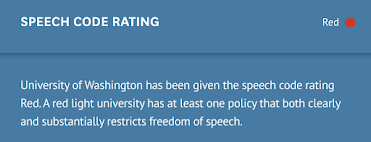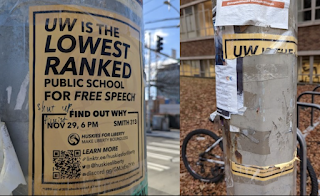Freedom of speech is the essential foundation for a democratic society. It is also a requirement for a functioning university. Freedom of expression is particularly protected by the First Amendment of the U.S. Constitution for public entities such as universities.
Disturbingly, a number of groups have noted serious problems regarding freedom of speech at the University of Washington. Groups both inside and outside the institution.
The Report of the Foundation for Individual Rights and Expression (FIRE)
FIRE is a highly respected non-partisan group dedicated to protecting freedom of speech at U.S. colleges and universities. Recently, it released a detailed report on freedom of speech at over 200 American colleges/universities, based on input from tens of thousands of students and faculty, as well as the review of materials from each institution.
The University of Washington was the lowest-rated of any public university in the nation.
Let me repeat: the UW was at the bottom of a long list of major public universities/colleges regarding freedom of speech. In fact, the UW was rated as "code red" for "clearly and substantially restricting freedom of speech."
Several hundred UW students were queried and most were fearful to speak their minds in public. For example, only 43% of students say they have rarely or never self-censored on campus. In other words, 57% are self-censoring.
FIRE noted that UW's Executive Order 31 allows the university "to discipline or take appropriate corrective action for any conduct that is deemed unacceptable or inappropriate, regardless of whether the conduct rises to the level of unlawful discrimination, harassment, or retaliation". Totally chilling and potentially illegal.
UW Students Organize For Freedom of Speech: Huskies for Liberty
The situation at the UW has gotten sufficiently serious that a large group of students has organized a new, nonpartisan student group to defend freedom of expression at the UW: Huskies for Liberty.
I attended one of their meetings a month ago and the stories I heard were disturbing.
For example, one young woman described unfortunate behavior by a faculty member after the student expressed an unpopular viewpoint in class. The faculty member even called out the student by name on social media and encouraged other students to make formal complaints. Shameful and outrageous.
The Huskies for Liberty group tried to post flyers around campus advertising their meetings, but those opposed to free speech tore many of them down (see below). Others had "editorial" comments marked on them that I cannot repeat on this blog.
The American Association of University Professors (AAUP) was born out of the attacks on academic freedom, including the loyalty oaths and communist purging during the cold war period. Unfortunately, AAUP has "evolved" during recent years to become a promotional organization for "progressive values." Their commitment to freedom of speech and diversity of ideas has waned.
For example, the UW AAUP website states: "where legally permissible speech shows potential to harm individuals or undermine the fundamental purposes of the academy, UW AAUP will advocate for resources that prevent or mitigate harm" Unfortunately, they have followed through on this approach, restricting freedom of speech of individuals with differing viewpoints.
For example, the AAUP has a popular listserv to which thousands of UW faculty and administrators subscribe. This moderated listserv is dominated by "progressive" viewpoints, with AAUP moderators frequently rejecting messages that differ from the AAUP moderators' viewpoints. I could supply dozens of examples of such censorship.
Here is an explanation by the current head of UW AAUP on why the listserv needs to be moderated (i.e., censored)
"The reason this list requires moderation is precisely so that it may function as an open forum for faculty to address and debate their issues and concerns. "
Censoring to foster an open forum? The Brave New World of the UW AAUP.
And a moderator of the AAUP list stated the following after rejecting a contribution with a different viewpoint:
“Our concerns remain about giving so much air time to those who seem to be hostile to the university’s attempts to amplify diversity, equity, and inclusion.”
So much for freedom of speech and diversity of viewpoint on the UW AAUP listserv.
The UW DEI Establishment
One of the most worrisome changes at the UW has been the establishment of a huge Diversity, Equity, and Inclusion infrastructure encompassing over 100 "diversity" deans, administrators, staff, and advisers.
The cost of this establishment is huge: from my analysis, it costs at least 5 million dollars a year in State funds. Students and their parents are paying for this. So is every state resident.
The UW DEI establishment advocates a highly politicized agenda, including pushing faculty to acknowledge that they work on stolen land, advocating for "equity" (equal outcomes for all demographic groups), preferences/affirmative action for a limited collection of favored demographic groups, and guidance on the use of pronouns and wording, to name only a few.
The UW community is told not to use words such as "whitebox, whitelist, master, dumb terminal, and "sanity check."
Some DEI staff have monitored the social media of professors, encouraging public criticism and attacks on faculty with "problematic" viewpoints. (more on this later!)
To ensure that incoming faculty support the politicized UW DEI viewpoint, applications from prospective faculty must include a DEI statement that notes their experience in fostering DEI and their future plans to push a DEI agenda.
To put it frankly, a political litmus test. And it is just as inappropriate as the loyalty oaths of the 1950s.
Last year, there was an attempt to require that current UW faculty provide a statement supporting DEI for promotion (e.g., tenure). This proposal was narrowly defeated by a vote of the faculty.
Attacking Faculty for Possessing Differing Viewpoints on Social Media or in Class
A key requirement for a functioning university is that students and faculty should be exposed to a range of viewpoints. Differing viewpoints that are discussed and analyzed in the search for truth.
Unfortunately, several UW faculty and staff have been attacked for alternate viewpoints. Let me give you some examples.
Consider, Professor Stuart Reges, a faculty member in computer sciences and the winner of several teaching awards. Professor Reges was concerned by the pressure to include a Native American land acknowledgment in class material, and, in protest, came up with an alternative version that was not to the UW's liking. He was threatened and hectored by administrators and told he faced investigation and potential punishment. Startlingly, his department set up a parallel section of his introductory class and then encouraged students to transfer out of his section.
Professor Reges has taken legal action against the UW and has a very good chance of winning.
Or consider Research Meteorologist Mark Albright, former Washington State Climatologist, who noted in 2007 on a listserv outside the UW that Washington State snowpack was not declining rapidly (we now know he was correct). At that time, he was the Associate State climatologist, and was FIRED from his position at the UW, because it might encourage "climate skeptics." Mr. Albright was a staff member in my group at the time, and I was pressured to fire him or take away his email privileges (which I did not do).
Finally, let me mention one of my own experiences. In 2016, I was a strong supporter of a non-partisan initiative for a state carbon tax to discourage fossil fuel use, with the funds returned to state citizens (I-732). Several climate activist groups opposed it because they wanted the cash. Two years later, they proposed I-1632, this time for a carbon tax in which they controlled the money to spend on their pet projects.
I wrote a blog opposing their poorly conceived approach. My department chair (a strong supporter of the initiative) and the College of the Environment Dean then encouraged the College's Dean of Diversity to write an email sent to my entire department noting the racist nature of my blog. They were trying to suppress speech even OUTSIDE the UW. Even worst, my department chair then invited the department to a "shaming session", where he and department activists called me all kinds of names. A member of my faculty grew up in China: she said it was exactly like the cultural revolution.
UW Faculty Fight Back
A growing group of faculty, from many departments and varied political viewpoints, is fighting back against the attempts to constrain speech and viewpoint diversity on the UW campus. Many are members of the national, non-partisan group known as the Heterodox Academy (HxA), started by well-known social scientist Jonathan Haidt. The UW HxA group has a very active listserv, local meetings, and a book discussion group. It helped organize the successful effort against mandatory DEI statements for advancement. If you are a UW faculty member, please join us (just join the national group or let me know).
A University in Fear Cannot FunctionThe UW has become highly politicized and there have been active attempts by UW administrators, some faculty, and a number of students to suppress viewpoints they don't like.
A university cannot function when freedom of speech is suppressed and students/faculty are afraid to express their viewpoints.
And let's be clear: many UW community members are afraid to frankly reveal and discuss their viewpoints on a range of topics.
Dozens of faculty and students have told me of their fears; even some members of the UW HxA group want to keep their association with HxA secret, fearful that their positions could be threatened.
The tools of fear are two-fold: (1) fear of being criticized, attacked or threatened for their views and (2) fear of being denied tenure, advancement, good grades, or academic opportunities. The combination is powerful.
The University of Washington is one of the leading universities in the world. We can be proud of that. But it will not retain this lofty position if freedom of expression continues to be undermined.
It is time for the leadership of the UW to make a clear commitment to free expression.
It is time to drop all political litmus tests, such as mandatory DEI statements.
It is time for the huge, expensive, and problematic UW DEI bureaucracy to be dismantled. Instead, the UW should treat each student and potential faculty/staff member as a valued, unique individual and not a representative of some group or special interest.
It is time to follow the law, both in letter and spirit.
Federal law REQUIRES that public institutions protect freedom of speech. And the Washington State Civil Rights Act, enacted by the voters through Initiative 200 in November 1998, specifically prohibits racial and gender preferences by state and local government.
It is time for the UW to act upon the words of UW President Ana Mari Cauce:"Speech by people we strenuously disagree with, and that is in fact hateful and repugnant, is the price we pay for democracy and to ensure our own freedom of speech. When we give the government the power to become the arbiter of what views are acceptable, then we have taken a step toward authoritarianism."
"Universities are by their very nature places for discussion and debate of controversial issues. These debates are absolutely critical to the educational experience and in developing citizens prepared to engage with democracy."
Whether you are a student, parent, staff member, faculty, donor, or state citizen make your wishes known, both to the university and the Washington State legislature.









